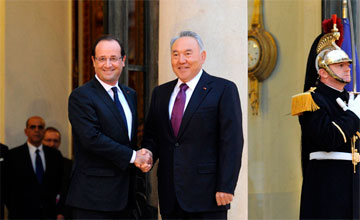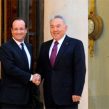
Presidential Summit Drives Kazakhstani-French Relations Forward
Publication: Eurasia Daily Monitor Volume: 9 Issue: 229
By:

During his recent visit to France on November 21–23, Kazakhstan’s President Nursultan Nazarbayev met with his counterpart Francois Hollande for the first time since Hollande became French president in May 2012. The successful encounter showed that Hollande wants to continue the high level of cooperation between the two countries that his predecessor, Nicholas Sarkozy, had initiated (Tengri News, November 22).
In 2008, Kazakhstan and France signed a landmark Treaty on Strategic Partnership, which called for expanded cooperation in such areas as banking, finance, energy, and tourism. Nazarbayev and Sarkozy subsequently met regularly in the annual sessions of the Kazakhstani-French intergovernmental commission as well as at various multilateral events. Intergovernmental agreements since 2008 have augmented bilateral cooperation in outer space, defense, fighting crime and corruption, and promoting economic innovation (https://www.diplomatie.gouv.fr/en/country-files/kazakhstan-389/).
The recent presidential summit shows that the Hollande government wants to sustain this high-level engagement despite some initial fears that bilateral ties might weaken due to the Socialists’ adoption of a more assertive democracy promotion agenda and due to their decreased interest in nuclear power. The two governments have announced that they will continue their annual commission sessions (trend.az, November 22).
Kazakhstan’s strategic role in the war in Afghanistan will help keep the two countries together. In 2009, the two governments signed an agreement permitting the transit of French military equipment and personnel through Kazakhstani territory. After his meeting in Paris with Hollande on November 21, Nazarbayev told journalists that the two heads of state had signed a document to facilitate the withdrawal of French troops from Afghanistan (Tengri News, November 22).
Even before the 2008 strategic partnership elevated bilateral political relations, Kazakhstan and France had begun to develop more robust economic ties. Leading French companies active in Kazakhstan include EADS in aeronautics, Alstom in transportation, as well as Areva, Bouygues, Lactalis, Thales, Vinci and Vika (Kazakhstani Foreign Ministry, November 23). The most prominent French firm remains Total, which is operating in the Kashagan oil field as well as in the production of natural gas in the Caspian Sea alongside GDF-Suez, a French gas company.
Altogether, French companies have invested more than $9 billion in Kazakhstan (Kazakhstani Foreign Ministry, November 23). This aggregate volume makes France one of the top five countries in Kazakhstan in terms of foreign direct investment. There are more than 100 joint ventures engaged in some two dozen large projects in Kazakhstan. Many of these companies belong to the Kazakhstani-French Business Council. Established in 2008, the Council has become the leading private business association joining the two countries.
France is also one of Kazakhstan’s leading trade partners, with the volume of two-way commerce amounting to $6 billion in 2011, 20 percent higher than in 2010. Between January and August 2012, bilateral trade amounted to $4.9 billion, a 32-percent increase over the first half of last year (Kazakhstani Foreign Ministry, November 23). Kazakhstan’s main exports to France are oil and other energy products, while Kazakhstan mainly buys capital equipment, luxury goods, and pharmaceutical products from France.
Reflecting that energy and defense have become key cooperative economic sectors, Nazarbayev held discussions with Bernard Bigot, Chairman of France’s Alternative Energies and Atomic Energy Commission, and Jean-Pierre Talamoni, Director of International Development at EADS, the Franco-German-Spanish aerospace giant, during his visit (Kazakhstani Foreign Ministry, November 23).
Bilateral business ties look to develop further under Hollande. During his visit, Nazarbayev met many French business leaders and economists, including Jacques Attali, the founder and first director of the European Bank for Reconstruction and Development and a leading French economist and visionary, to discuss various bilateral and multilateral economic issues (Caspionet, November 22).
Another of Nazarbayev’s interlocutors was Patrick Kron, the chairman of Alstrom, the world’s largest manufacturer of rail and power equipment. Alstrom has a joint venture with Kazakhstan Railways (KTZ) to manufacture electric locomotives and other railroad items in Kazakhstan. The French engineering giant has a long-term localization strategy for Kazakhstan, which Alstom hopes to use as an export platform for other CIS markets (International Rail Journal, December 13). Alstom will also train Kazakhstani locomotive drivers and is seeking to construct a light rail network using trams in Almaty and Astana (Caspionet, November 22).
During his recent Paris visit, Nazarbayev also underlined Kazakhstan’s interest in cooperating with France in education, agriculture, research, and culture. Representatives of Kazakhstan’s Ministry of Agriculture visited veterinary schools in Toulouse and Lyon at the beginning of November to discuss exchange possibilities of teachers and students between French schools and Kazakhstani veterinary schools. Since the Treaty on Understanding, Friendship and Cooperation signed in 1992, academic cooperation has been facilitated by partnerships like the one between ENA, the French National School of Administration and the Kazakhstani Academy for Public Administration. Hundreds of Kazakhstani students receive grants to study in France.
Nazarbayev also used his visit to bolster support for Kazakhstan’s candidacy to host the International Exhibition EXPO-2017. Astana, the capital of Kazakhstan finally won against the other finalist, the Belgian city of Liège, at the vote of the International Exhibition Bureau on November 22, the second day of Nazarbayev’s visit to France. Kazakhstan’s Prime Minister Serik Akhmetov personally thanked the French government for its crucial support for the EXPO-2017 decision when they met in Astana in mid-December (Kazinform, December 14). This decision marks the first time that a Central Asian country has been entrusted with organizing such an exhibition. The planned theme of this exhibit, “Energy of the Future,” is of clear interest for France and other European countries.
Nazarbayev also invited President Hollande to make an official visit to Kazakhstan, which would further affirm that maintaining good relations with Kazakhstan remains a priority for French foreign policy despite the leadership change in Paris.




